Is it not suitable to get married in 2024, the "widow year"? Is the saying that "a year without spring is unlucky" true?

|
Today, an old folk rumor topped the trending searches: 2024, the Year of the Dragon, is a "year without spring" and a "year for widows", and is not suitable for marriage. Image source: Weibo screenshot Let me first state the conclusion: this is of course an absurd statement. The ancients desperately tried to predict the future from all signs, including astronomical calendars, which gave rise to the absurd statement of "widow year". However, although it is funny, it can be verified - the so-called "year without spring" refers to a lunar year without the Beginning of Spring solar term , just like there is no 29th day in February in the Gregorian calendar. It is just a phenomenon determined by the calendar rules and has nothing to do with other things. The "Year without Spring" is just a coincidence between the lunar calendar and the Gregorian calendar If you open the calendar, you will clearly see that there is a Beginning of Spring solar term in 2024. How can it be called a “year without spring”? Note that the so-called "year without spring" refers to the next year of the lunar calendar, that is, there is no beginning of spring in the year of Jiachen. The beginning of spring in the Gregorian calendar in 2024 is February 4, which is still in this year of the lunar calendar, the year of Guimao. Here we need to distinguish between the Gregorian calendar and the lunar calendar. Let's open the calendar and look at a few decisive dates: January 1, 2024 (New Year’s Day), the 20th day of the 11th month of the Year of the Rabbit; February 4, 2024 (the beginning of spring), the 25th day of the twelfth month of the Year of the Rabbit; February 10, 2024, the first day of the first lunar month of the Year of the Dragon (Chinese New Year); January 1, 2025 (New Year’s Day), the second day of the twelfth month of the Year of the Dragon; January 29, 2025, the first day of the first lunar month of the Year of the Snake (Chinese New Year); February 4, 2025 (the beginning of spring), the sixth day of the first lunar month in the Year of the Snake. The Gregorian calendar year 2024 runs from New Year's Day on January 1 to December 31, a total of 366 days, including the Beginning of Spring and the complete 24 solar terms. The lunar year of Jiachen is from the first day of the first lunar month (February 10, 2024) to the twenty-ninth day of the twelfth lunar month (January 28, 2025), a total of 354 days, without the Lichun solar term. Every 19 years There are 7 years without spring. First of all, we need to correct a common misunderstanding. The Chinese lunar calendar is not the lunar calendar, but a combined solar and lunar calendar. The lunar calendar is a calendar that uses only the moon phase cycle to record the months and has only 12 months in a year, such as the Islamic calendar. The solar calendar uses only the solar cycle, that is, the period of the Earth's revolution around the sun, and is a calendar with 365 or 366 days as a year, such as the Gregorian calendar. The lunar calendar is a compromise between the lunar cycle and the solar cycle. The lunar calendar takes the lunar cycle as one month (29 or 30 days), and uses a leap month (an extra month) to adjust the length of the year. In other words, a common year has 12 months and 354 days, and a leap year has 13 months and 384 days, so that the average length of many years is equal to the solar cycle . So although the ancients also knew that there were "360 days in a year", in fact, ancient China never used 365 or 366 days in a year. Year after year, in ancient astronomy, the cycle of the sun's movement is 365.2422 days. The ancients divided it into 24 solar terms, each of which lasts about 15 days, and each solar term is divided into three periods, for a total of 72 periods. Therefore, the 24 solar terms are also an indispensable component of the solar calendar and the lunar calendar. So we have three things in our hands: 1. Solar terms - can be obtained by observing the sun; 2. Month - can be obtained by observing the changes in the moon phases; 3. Year - Now the question arises, when does a year begin? Although the Beginning of Spring is regarded as the first solar term of the four seasons, in fact, when astronomers formulated the calendar, they paid the most attention to the winter solstice. It was not for any other reason, but because it was easy to observe - the winter solstice has the shortest day and the longest night, especially at noon when the shadow cast by the sun is the longest. For this reason, starting from the time of Emperor Wu of the Han Dynasty, the lunar calendar stipulated that the month of the winter solstice was defined as November. The winter solstice and the beginning of spring are 45 days apart. If the winter solstice is at the beginning of November, the beginning of spring must be before the first day of the Lunar New Year of the following year; if it is at the end of November, and there is no leap November or leap December, the beginning of spring must be after the first day of the Lunar New Year. Taking this year without spring as an example, the winter solstice of Guimao year was November 10, so the beginning of spring 45 days later could only be on the 25th day of the twelfth lunar month of Guimao year. The winter solstice of Jiachen year was November 21, which made the beginning of spring 45 days later only on the sixth day of the first lunar month of Yisi year, making Jiachen year a "year without spring". The cycle of the Lichun solar term is 365 days, and the length of the lunar year is 354 (ordinary year) or 384 (leap year). Due to the difference in the number of days in the cycle, it is actually very common to have a year without spring. In every 19 years, there are 7 years without spring, 7 years with two springs at the beginning and the end, and 5 years with only the Lichun. Copyright images in the gallery. Reprinting and using them may lead to copyright disputes. Why did the ancients think Is “a year without spring” unlucky? Astronomers attach importance to the winter solstice, but society pays more attention to the Beginning of Spring because it is the first day of spring and is also the ancient Spring Festival, also known as "the beginning of spring." It is very important. Our ancient New Year's Day is today's Spring Festival (the first day of the first lunar month), which is around the beginning of spring. According to the Book of Rites, "On the day of the beginning of spring, the emperor personally led the three dukes, nine ministers, princes, and officials to welcome spring in the eastern suburbs. When he returned, he rewarded the dukes, ministers, princes, and officials in the court." However, due to the inharmonious dual-track system of the lunar calendar, which is a combination of the yin and yang calendars, it is inevitable that there will be "two springs at the end" and "years without spring". Why did the ancients think that "years without spring" were unlucky? This is based on a common cultural psychology, that is, the desire to predict the future. For the ancients, life was much more difficult than it is for us. Wars, famines, floods and droughts, and even strange solar eclipses all seemed mysterious and unsolvable. Therefore, from the court officials to the common people, everyone was eager to predict what might happen in the future, whether the war could be won, how the harvest would be, and whether any threats would occur. Under this mentality, astronomy, which could formulate calendars in advance, was shrouded in mystery and was entrusted with the expectation of "prediction" - this is how ancient astrology was born. The "Beginning of Spring" solar term is a sign of the beginning of spring. After the "beginning of spring", it is time to prepare for the next year's major events. The emperor has to offer sacrifices to the gods, and the farmers have to cultivate the land. But don't you think it's strange that such an important solar term as the Beginning of Spring actually disappears in some years. Will its absence become the root cause of misfortune in the new year? Based on the "principle" of "it is better to believe it than not to believe it", the "year without spring" is labeled as "widow year" and "unlucky", which may be especially unfavorable for marriage and even all matters related to childbirth. But in fact, the calendar given by astronomy can only help us count the days and know how to calculate the year, month and day. It does not have any predictive function. If we slightly modify the definition of year, month and day, then the phenomenon of "two springs at the beginning" and "year without spring" may no longer exist. For example, if we modify the lunar calendar and celebrate the New Year one month earlier, the beginning of spring will fall at the end of January or the beginning of February of each year, then there will be "spring" every year. Or, as the Song Dynasty scientist Shen Kuo proposed, abolish the "lunar calendar" and divide the months into 12 months according to the 24 solar terms, stipulating that the beginning of spring is the first day of the first lunar month. In fact, it is completely changed to the solar calendar, so the first day of each year is "spring". There is really no need to regard a certain year as unlucky for various reasons. After all, every New Year is a day worth looking forward to. Planning and production This article is a work of Science Popularization China-Starry Sky Project Produced by: Science Popularization Department of China Association for Science and Technology Producer|China Science and Technology Press Co., Ltd., Beijing Zhongke Xinghe Culture Media Co., Ltd. Author: Sun Zhengfan, PhD in Astronomy, popular science author Planning丨Lin Lin Editors: Lin Lin, He Tong |
>>: What if there is a black hole at the center of the sun? Astronomers are really studying it!
Recommend
1 Gu Ailing = 100+ popular headlines?
The hot topic that marketers are paying attention...
How much does it cost to rent a game server per month?
How much does a game server cost per month? How m...
I heard you started growing vegetables? Here are some vegetables I recommend...
What are you doing at home during this lockdown? ...
Liquid rocket reuse, where to focus next?
Recently, a type of liquid oxygen-kerosene engine...
Alipay circles, Durex trial with 100 people... Why is the marketing of this generation of Internet companies failing?
Li Jiaoshou once told a joke. A man and a woman f...
Will Xindong Takeaway be the next entrepreneurial opportunity? How to become an agent for Xindong Takeaway?
Today I accidentally saw a video about Xindong ta...
Qimao Free Reading Novels, can Qimao Free Reading Novels be read automatically?
Qimao Free Novels is a novel reading platform tha...
Browser rendering process and performance optimization
As we all know, the application layer of the Worl...
How could a cat fall in love with tuna when it lives inland?
The impression that "kittens love to eat fis...
After analyzing 6,000 apps, I found that there are so many great apps that I haven’t used yet.
[[251580]] Abstract: Nowadays, mobile Internet is...
Drools rule engine practice
Part 1 Rules Engine Rule engine: The full name is...
Today, to all the parents at home! Please share "A loving family"
Expert in this article: Yang Jing, PhD in Immunol...
I'll do 798 too! Toyota Corolla is angry, but domestic brands are happy
After the BYD Qin L with a starting price of 99,8...
Look! Baidu Information Stream OCPC, have you put it on?
Unstable conversion effect? Is the cost of lead a...
An inventory of the best value-for-money headphones at the end of the year: Which would you choose, WF-SP800N or Powerbeats Pro?
In recent years, "true wireless" headph...









